Intro
Discover your blood type and unlock secrets to health, diet, and compatibility. Learn about ABO blood groups, Rh factor, and genetic traits to understand your unique profile.
Understanding the importance of blood types is crucial for various aspects of healthcare, from transfusions to disease prevention. The human body contains approximately 5 liters of blood, which is composed of several components, including red and white blood cells, platelets, and plasma. Among these components, the red blood cells play a vital role in determining an individual's blood type. There are four main blood types - A, B, AB, and O - each with distinct characteristics that make them unique. Knowing one's blood type can be a lifesaver in emergency situations, and it's essential for pregnant women, individuals with certain medical conditions, and those who require frequent blood transfusions.
The discovery of blood types dates back to the early 20th century, when Austrian physician Karl Landsteiner identified the ABO blood group system. This breakthrough led to a significant reduction in transfusion-related complications and fatalities. Today, blood typing is a routine procedure in hospitals and medical facilities worldwide. With the advancements in medical technology, it's now possible to determine an individual's blood type with a simple test, making it easier for people to learn about their blood type and take necessary precautions.
The significance of knowing one's blood type extends beyond medical emergencies. Research has shown that certain blood types may be more susceptible to specific diseases, such as heart disease, cancer, and infections. For instance, individuals with type O blood are less likely to develop heart disease, while those with type A blood may be more prone to stomach cancer. Although these findings are not conclusive, they highlight the importance of understanding the relationship between blood types and disease prevention. By knowing their blood type, individuals can take proactive steps to reduce their risk of developing certain conditions and maintain overall health and well-being.
Introduction to Blood Types
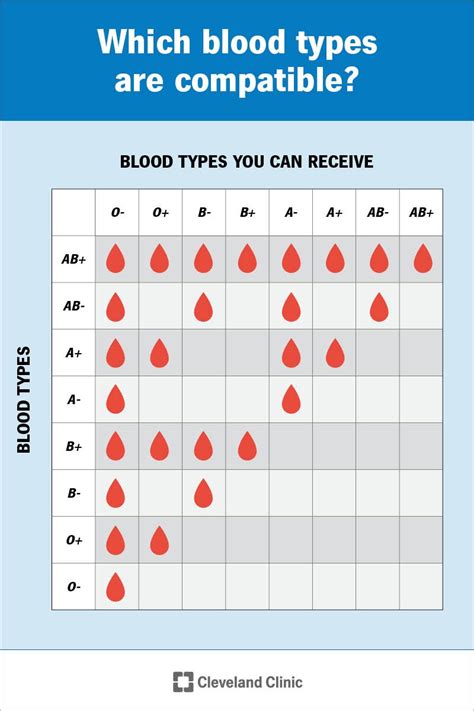
The ABO blood group system is the most common method of classifying blood types. It's based on the presence or absence of specific antigens on the surface of red blood cells. Antigens are substances that can trigger an immune response, and in the case of blood types, they determine whether an individual's blood is compatible with another person's blood. The four main blood types are:
- Type A: Has A antigens on the surface of red blood cells
- Type B: Has B antigens on the surface of red blood cells
- Type AB: Has both A and B antigens on the surface of red blood cells
- Type O: Has neither A nor B antigens on the surface of red blood cells
Understanding Blood Type Compatibility
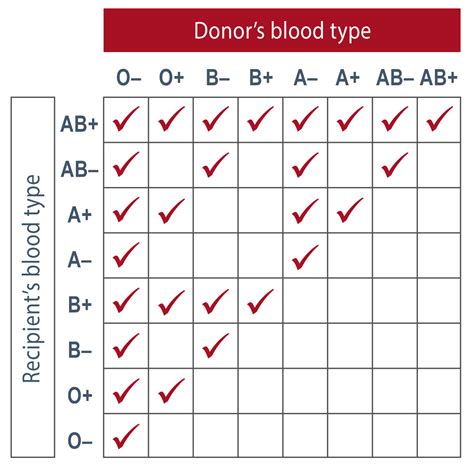
Blood type compatibility is crucial for transfusions, as incompatible blood can lead to severe reactions, including anaphylaxis and even death. The following rules apply to blood type compatibility:
- Type A blood can receive blood from type A and type O donors
- Type B blood can receive blood from type B and type O donors
- Type AB blood can receive blood from type AB, type A, type B, and type O donors
- Type O blood can receive blood from type O donors only
The Rh Factor
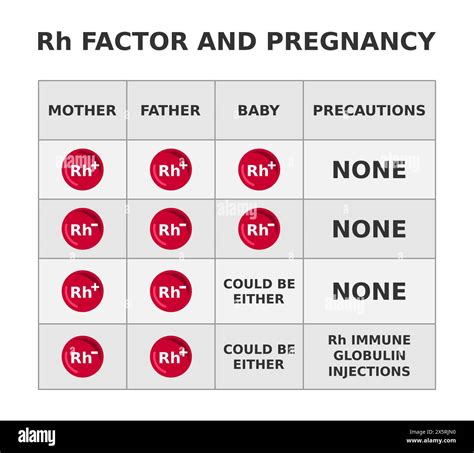
In addition to the ABO blood group system, the Rh factor is another critical component of blood typing. The Rh factor is a protein found on the surface of red blood cells, and it can be either positive (Rh+) or negative (Rh-). The Rh factor is essential for pregnant women, as an Rh- mother carrying an Rh+ fetus can lead to complications during pregnancy.
Pregnancy and Blood Type
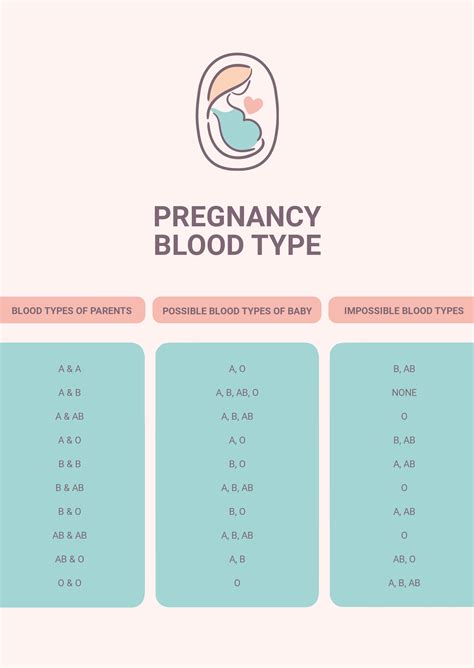
Pregnant women with Rh- blood type may require special care to prevent complications during pregnancy. If an Rh- mother is carrying an Rh+ fetus, the mother's immune system may react to the fetus's Rh+ blood cells, leading to the production of antibodies. These antibodies can cross the placenta and attack the fetus's red blood cells, causing anemia and other complications. To prevent this, Rh- mothers are typically given Rh immunoglobulin (RhIg) injections during pregnancy to suppress the production of antibodies.
Disease Prevention and Blood Type
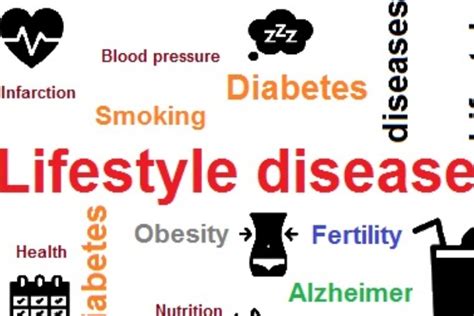
Research has shown that certain blood types may be more susceptible to specific diseases. For example:
- Type O blood: Lower risk of heart disease, but higher risk of stomach ulcers
- Type A blood: Higher risk of stomach cancer, but lower risk of blood clots
- Type B blood: Higher risk of pancreatic cancer, but lower risk of heart disease
- Type AB blood: Higher risk of leukemia, but lower risk of heart disease
While these findings are not conclusive, they highlight the importance of understanding the relationship between blood types and disease prevention. By knowing their blood type, individuals can take proactive steps to reduce their risk of developing certain conditions and maintain overall health and well-being.
Practical Tips for Blood Type Management
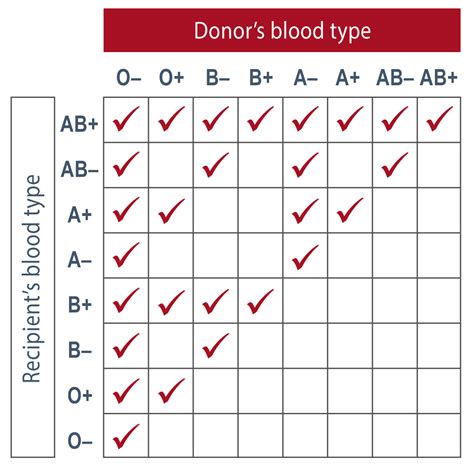
Here are some practical tips for managing your blood type:
- Know your blood type: Get tested and learn about your blood type to take necessary precautions
- Eat a balanced diet: Focus on foods that are beneficial for your blood type, such as:
- Type O: Lean meats, fish, and vegetables
- Type A: Fruits, vegetables, and whole grains
- Type B: Dairy products, meats, and vegetables
- Type AB: A combination of type A and type B diets
- Exercise regularly: Regular physical activity can help reduce the risk of chronic diseases, regardless of blood type
- Manage stress: High stress levels can exacerbate health conditions, so engage in stress-reducing activities like meditation or yoga
Conclusion and Next Steps

In conclusion, knowing your blood type is essential for maintaining overall health and well-being. By understanding the unique characteristics of your blood type, you can take proactive steps to reduce your risk of developing certain conditions and manage your health more effectively. Whether you're pregnant, have a medical condition, or simply want to stay healthy, learning about your blood type can be a valuable investment in your health.
We invite you to share your thoughts and experiences with blood types in the comments below. Have you learned something new about your blood type? Do you have any questions or concerns about blood type management? Share this article with your friends and family to help them learn more about the importance of blood types.
What are the main blood types?
+The four main blood types are A, B, AB, and O, each with distinct characteristics that make them unique.
Why is it important to know my blood type?
+Knowing your blood type is crucial for various aspects of healthcare, from transfusions to disease prevention, and can help you take proactive steps to reduce your risk of developing certain conditions.
Can I change my blood type?
+No, your blood type is determined by your genetics and cannot be changed. However, you can take steps to manage your health and reduce your risk of developing certain conditions based on your blood type.
How can I learn more about my blood type?
+You can learn more about your blood type by talking to your healthcare provider, getting tested, and researching reputable sources online. You can also share this article with your friends and family to help them learn more about the importance of blood types.
What are some practical tips for managing my blood type?
+Practical tips for managing your blood type include eating a balanced diet, exercising regularly, managing stress, and getting enough sleep. You can also focus on foods that are beneficial for your blood type and take proactive steps to reduce your risk of developing certain conditions.
